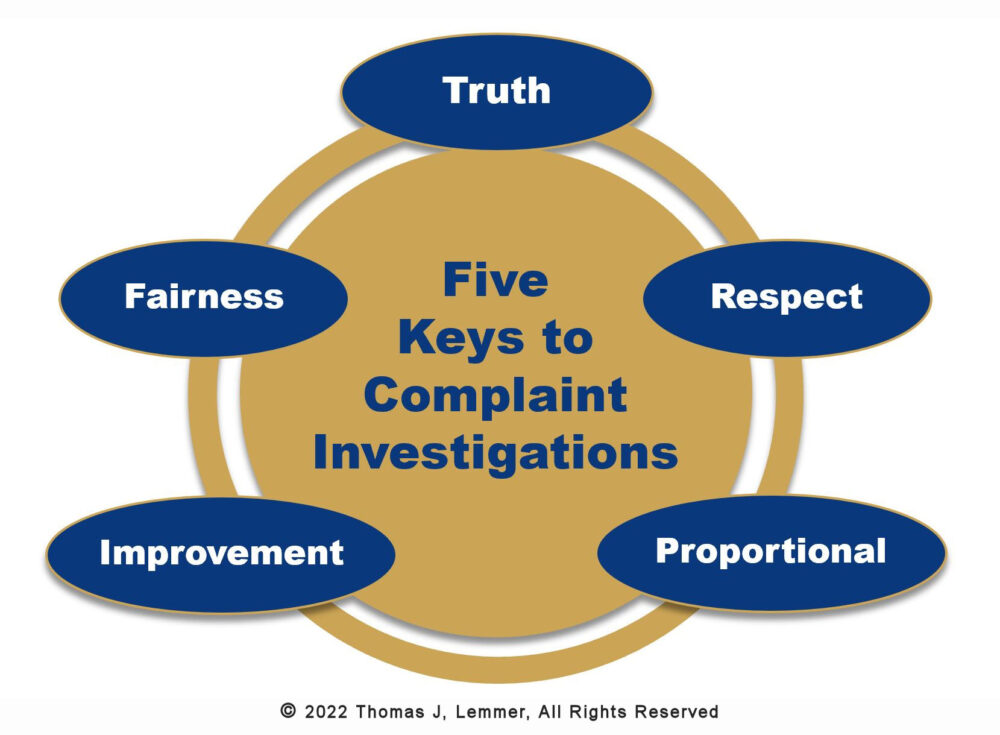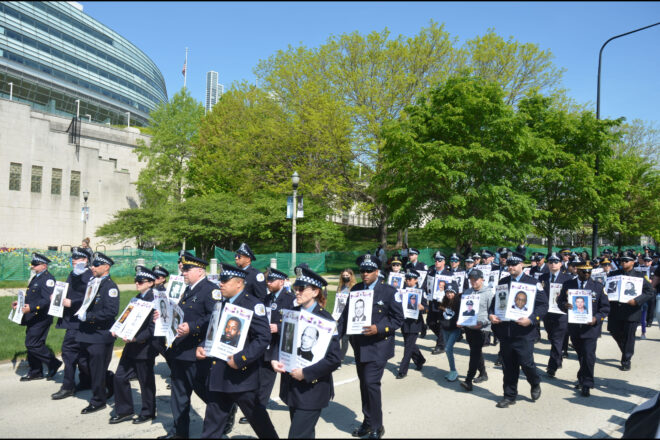Chicago has a need for clarity on the basics of handling complaints against the police. This need was apparent during the Chicago City Council process reviewing the nomination of Ms. Andrea Kersten to permanently head the Civilian Office of Police Accountability (COPA). COPA is the city’s civilian agency tasked with investigating most serious allegations of police misconduct. During the 21 January 2022 Public Safety Committee Hearing reviewing the Kersten nomination, Alderman Anthony Napolitano raised this issue. The alderman specifically noted that under Ms. Kersten, COPA has shown a pattern of overreach and non-proportionality. Ms. Kersten was then the acting head of the agency, and she was previously its Chief of Investigative Operations.
Estimated reading time: 6 minutes
Five Complaint Investigation Keys
This “Insight” posting is intended to provide clarity on the approach that should be utilized in the necessary work of investigating allegations of police misconduct. Such is essential to the larger objective of public safety. In handling complaints against police officers, those assigned to investigate must distinguish between error (even tragedy) and true misconduct. The process should also seek to advance five key pillars: truth, fairness, respect, improvement, and proportionality. Each of these five elements is essential to advancing the legitimacy within the process that simultaneously meets the needs of the community, department, and the officers.

Truth
While on its surface, a search for truth may appear both obvious and easy to achieve, such can be difficult to discern. Gathering the facts as to what has occurred can be extremely challenging. Factors that can impact a search for truth, and then complicate an accurate understanding of an incident, include:
(a) locating all the involved parties and relevant witnesses;
(b) the limitations of sight and sound;
(c) the vantage point of those involved;
(d) the availability and limitations of technology and other physical evidence;
(e) the stress levels of the involved parties;
(f) emotions; and even
(g) the lack of candor or the presence of an agenda for one or more parties.
Additionally, many now speak to truth being personal, as in “my truth” versus purely “the truth.” As much as possible, the handling of complaints must work out from “the truth,” while seeking to understand the potential presence and impact of any versions of any participant’s “my truth.”
Fairness
Increasingly, differences and conflicts are judged from a competitive outcomes-based perspective. Who won? In dealing with citizen complaints, the perceptions of fairness cannot be judged simply based upon whether “my view” or position won out in a win-loser scenario. Complainants must be confident that the issue they bring forward will be properly reviewed. Simultaneously, the involved officers must be confident that the investigation of complaints will be fact-based, appropriately measure the actions of all involved parties, and adhere to an evaluation of the facts known to the involved officers at the time, and considered in light of the law and the department’s established policies and delivered training.
Respect
The process must be one that is respectful. Experience has shown that a significant portion of citizen complaints stem from a perception that they were not treated with respect. Similarly, many police officers believe that departmental processes that address citizen complaints are often lacking in respect for their efforts and challenges they faced. Such can be the case when officers are held accountable individually for failures that involve the lack of training, equipment deficiencies, staffing shortages, flawed supervisory direction, a lack of management engagement, or bad policies.
Improvement
Citizen complaints can provide for opportunities for improvement on multiple levels, and management should see improvement as a primary objective. Areas to seek improvement include:
(a) officer performance, both individually and across all officers;
(b) complainant and community understanding relative to police procedures; and
(c) organizationally through improved processes, policies, training, and staff support.
Proportionality
When a complaint is sustained against an officer, the sanctions imposed on the officer must be proportional to the circumstances. These circumstances must include an examination of five key factors: the harm caused, intent of the officer, skills deficiency, incitement source, and supervisory culpability.
(1) What harm resulted from the involved conduct to the complainant, others, the community, department and profession? Was the harm minor (even trivial) or egregious (even life ending)?
(2) What was the intent of the officer? Was the involved conduct one comprising an error, miscalculation, or accident, versus a deliberate or intentional action? Was the underlying incident one born out of tragedy, or one rooted in malice?
(3) Was the harm the result of inexperience and or a lack of training? If so, was this deficiency an unanticipated failing not covered in formal training, or a reflection of an officer not being professionally diligent?
(4) Was the misconduct incited by the inappropriate instigation (either verbal provocation or physical action, or both) of the complainant or others? Was that incitement minor (even trivial) or egregious (even potentially life ending)?
(5) Was their underlying supervisory culpability? Was the officer directed to take inappropriate or inadvisable actions that led to the conduct that was the subject of the sustained finding?
Additionally, of course, any sanction imposed must be consistent with the law and any applicable collective bargaining agreements.
Getting It Right
Public safety in America relies on the strength of the police-community relationship. The handling of complaints of police misconduct must be a priority – and a priority with respect to getting it right. The way forward must be one with broad outreach across community partners.
As a community, we need our elected and civic leaders to foster unifying approaches that advance constitutional policing, reduce violence, address chronic crime conditions, improve public safety, protect victims, foster wellness, and enhance community support for the police. Those seeking and participating in police reform efforts must not lose sight of these core elements. Yes, police misconduct must always be addressed. But, in investigating and addressing these incidents the process must seek truth, fairness, respect, improvement, and proportionality.
As a profession, it is essential that our police departments pursue the heights of excellence. The profession must fully reawaken its community policing roots, and engage in active problem-solving directly with all community residents and stakeholders. Policing must honestly seek to reach the hearts and minds of the community and call them to action. If the profession seeks to regain the support necessary for our police departments to meet their public safety mission – the voices of support for the police must be heard from across the community of “us.”
Training and Consulting Services
Comprehensive training courses, as well as consulting services are in continual development and are available now from Secure 1776 in the following topic areas: community policing, juvenile crime, gangs, violence, patrol operations, police and public safety policy development, internal investigations, supervisory engagement, and management accountability. Learn more by visiting our Training and Consulting Services section.
We are interested in your thoughts, and invite you to comment below.



Well written and insightful.
Thank you for the positive feedback.
Unfortunately I don’t think COPA meets any of the 5 pillars. And the poor judgement demonstrated by Kerstan makes it unlikely that they will improve under her leadership. The Department’s disciplinary system has completely lost legitimacy. Lower ranking members receive heavy handed disciplined for policy violations while exempt members are not. For example, the First Deputy, Eric Carter, was not disciplined for wearing ribbons on his uniform that he did not earn. Now, allegations have risen that he lied on his annual ethics report, and that he violated the secondary employment order. For the department to establish disciplinary legitimacy they must start at the top.